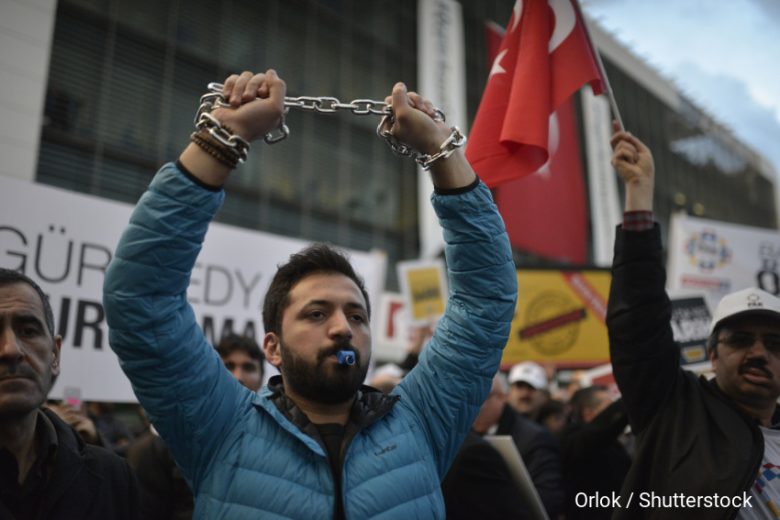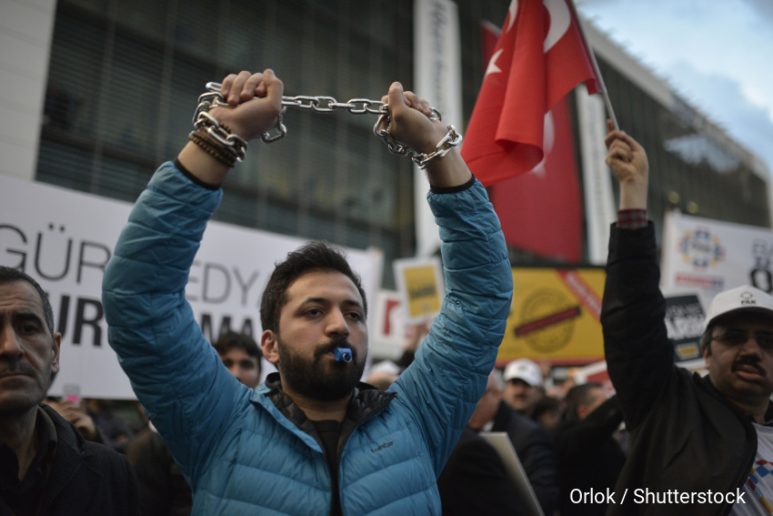By Kaan Göktaş
Last October, the Turkish government introduced a new controversial media law that has caused much public debate. The ‘Law on Combatting Disinformation’, aimed at “protecting the public from misinformation on social media and fake news in the media” passed with the government’s majority vote despite the opposition rejecting it. Media organisations and the opposition call it ‘the censorship law’, claiming it is an attempt to restrict freedom of expression and the use of social media. They are calling for its withdrawal. For those who report on sensitive and diverse issues such as the LGBT or ethnic and religious minorities, this law could be detrimental to their work as it would lead them to self-censorship.
When introducing the law in parliament, government officials and President Tayyip Erdoğan argued that “especially during large-scale social events, such as terrorist acts, popular uprisings, natural disasters, etc., a lot of misinformation is deliberately disseminated through social media, and after a while this misinformation begins to be accepted as truth by the society, which is conducive to disrupting social peace.” The opposition, on the other hand, reacted strongly to the draft law, claiming that it was an undemocratic law designed to prevent criticism of the government. The Peoples’ Democratic Party (HDP), which is a pro-minority party, stated that the sole purpose of this law is to censor news about corruption and lawlessness in the run-up to the elections, and that “the law is against international conventions, human rights and freedom of expression”.

Journalists’ organisations have reacted strongly to the law, pointing out that the concept of “disinformation crime” is a subjective one that is completely open to interpretation, and that the provisions in the same law regarding internet news websites, social media platforms and messaging applications are unacceptable and constitute a violation of freedom of expression and communication. The Journalists’ Union of Türkiye published a guide for Turkish journalists and warned its members after the law was passed.
According to the law, anyone who knowingly and intentionally publishes or shares false information or untrue news, or even re-shares what someone else has shared, is liable to imprisonment. However, the concepts of “false information” or “untrue news” mentioned in the law are entirely subjective and based on interpretation. For example, the law does not specify which authority decides whether a news item is “fake news”, or a tweet contains “false information”, or on what basis this decision is to be made. Therefore, the law leaves the decision on whether news or social media content is “fake news, misinformation or disinformation” to the police officers who first accept the reports, then to the prosecutors who conduct the investigation and preliminary examination, and finally to the judges who decide on imprisonment.
In Türkiye, police officers are authorized to carry out so-called “virtual patrols” which continue despite the Constitutional Court’s annulment on the grounds they violate personal privacy and freedom of communication. In addition, complaints made to the Presidential Communication Center (CIMER), which normally conveys citizens’ suggestions, recommendations and complaints to the Head of State, are also directly forwarded to the police. This leads citizens to practice a form of self-censorship in order to avoid getting into trouble with the police and government.
Reporters without Borders list Türkiye in the 165th place of their index. According to their report:
“Journalists who criticise or question well-known religious figures are sometimes the targets of lawsuits accusing them of “insult”. References to domestic violence or various forms of abuse, especially when made by women journalists, can give rise to social media hate campaigns.”
The disinformation law will enable the authorities to legitimize those social media campaigns and to target journalists who report on such issues.
If a social media post or online news story is the subject of a complaint, first police officers and then prosecutors launch an investigation. As part of the investigation, the person who posted the tweet or the journalist who reported the news is taken into custody for questioning. To ensure the implementation of this law on social media platforms, where anonymity is essential, the Turkish government has added two very controversial clauses to the law: First, if a social media post, such as a tweet or Facebook post, receives a complaint the authorities request the users’ personal details from the social media company. According to the law, even giant social media platforms such as Twitter and Facebook must comply and hand over user data to the Turkish authorities. If they do not comply, the bandwidth of the social network in question is first restricted, and if they fail to comply again, access is banned altogether. The social media platform in question can also be banned from receiving advertisements from Turkish companies and from running ads in Türkiye. This means potentially millions of dollars in losses for social media platforms. Therefore, it is thought that social media platforms will hand over this information to Turkish authorities unless they face a huge public backlash.
Sansür Yasası işlemeye başladı!
Deprem bölgelerinde yaptığım yayın ve paylaşımlar nedeniyle bugün ifade verdim.İfade vermeme neden olan konu ise şu tweette anlattıklarım…
👇👇 https://t.co/O0FtNse3G1— Ahmet Sesli (@Ahmet_Sesli_) February 28, 2023
The second controversial article is on internet anonymity. The “right” to anonymity and privacy provided by social media platforms in particular, and the internet in general, is an additional criminal offense under Turkish law. The Turkish government interprets this as “knowingly and willfully concealing one’s identity while committing a crime” if the post is made from an anonymous account, just like a street protester covering his or her face with a mask. For this reason, the prison sentence for posts made from anonymous accounts or with nicknames that do not explicitly include the real name is 1.5 times more severe than usual.
The controversial “censorship law” was most clearly applied during the massive earthquakes in Türkiye and northern Syria in February. In the first two days of the earthquake, protests against the government escalated.
Media Freedom Rapid Response (MFRR) called on the Turkish authorities not to impose further restrictions on the media in the wake of the protests and arrests.
The government took advantage of the earthquake protests and the resulting chaos to use the “censorship law” as a weapon against independent and opposition media outlets. Within a week of the earthquake protests, a number of media outlets were fined or shut down, including the website of the Erbil-based media group Rudaw, Botan Times, the news website of Botan International in cooperation with Reporters Without Borders (RSF), Podcast Kurdi, a Kurdish podcast publisher, and Hurbini, Kurdish-language websites and accounts such as the social media accounts of the internet newspaper Mezopotamya Agency. The YouTube channel of the left-wing Evrensel newspaper, the online sales store of a publishing house that publishes Kurdish books, Ekşi Sözlük, a Reddit-like forum and one of the most popular websites in Türkiye, and the Twitter account of Dutch journalist Frederike Geerdink were also censored and access was blocked in Türkiye.
In the same week, according to a statement of the General Directorate of Security, 771 account administrators who made “provocative posts” on social media platforms were identified, an investigation was launched against 395 of them, 127 people were detained and 24 were arrested.
The first journalist to be sentenced to prison under the censorship law was Sinan Aygül, a local journalist in the eastern Turkish province of Bitlis. Within the scope of an investigation launched against Aygül for reporting on an allegation of sexual harassment, the journalist was first taken into custody and then sent to prison to be tried in pre-trial detention. Aygül was charged with “publicly disseminating misleading information” and sentenced to 10 months in prison. Aygül exercised her right to remain silent and did not defend herself during the trials, saying “if I defend myself, I would be legitimizing this outdated law”. As of 3 May 2023, 34 journalists have been arrested in Türkiye during the past 11 months.
Photo Credit: Orlok / Shutterstock

